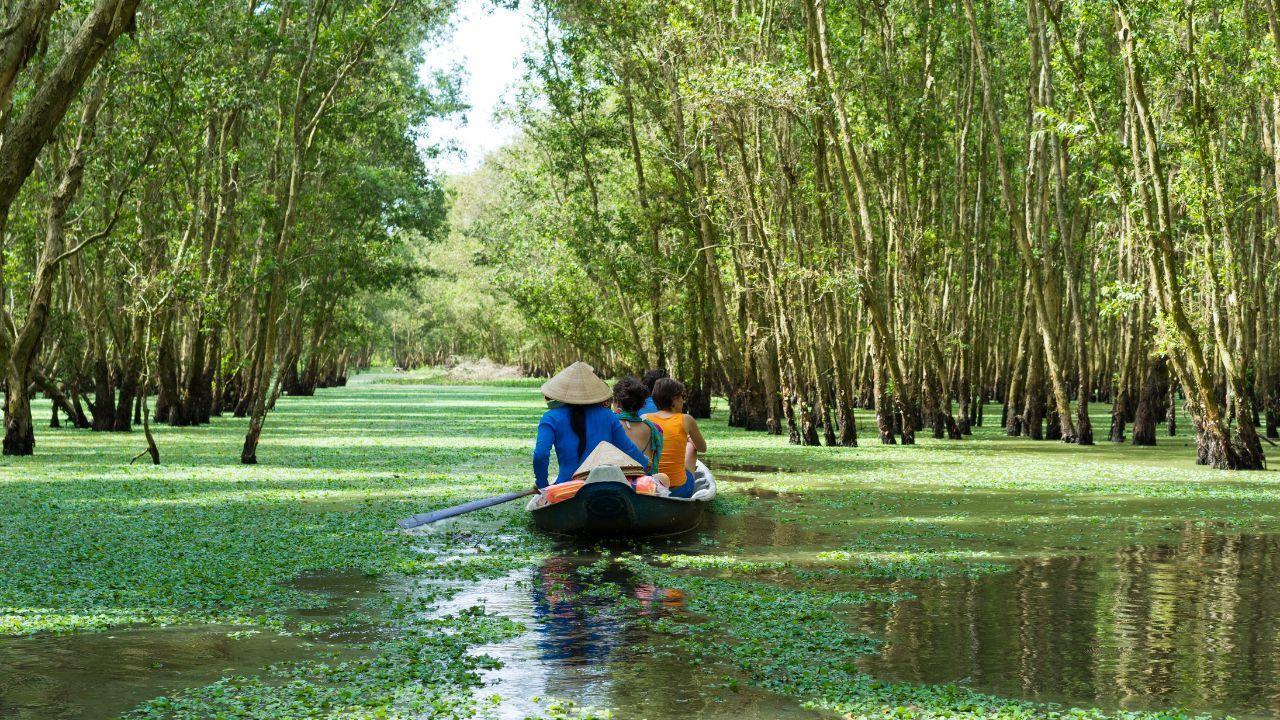
Post by : Zayd Kamal
Eco-Tourism Destinations: The Future of Sustainable Travel
In recent years, the tourism industry has seen a shift toward more sustainable practices, with eco-tourism taking the lead in redefining how we travel. Eco-tourism destinations are not only offering beautiful landscapes and cultural experiences, but they are also leading the charge for a future where travel can coexist with environmental conservation. These destinations emphasize preserving natural habitats, supporting local communities, and fostering a deeper connection between travelers and nature. But how exactly are these eco-friendly spots making an impact on the tourism industry, and why should travelers care? Let’s dive into how eco-tourism destinations are shaping the future of sustainable travel.
The Rise of Eco-Tourism and Its Global Impact
As climate change and environmental degradation become ever more pressing issues, travelers are increasingly looking for ways to reduce their carbon footprint while still exploring the world. Eco-tourism destinations are benefiting from this growing demand for sustainable travel by providing eco-friendly alternatives to traditional mass tourism. Unlike conventional tourism, which often contributes to environmental damage, eco-tourism aims to minimize the impact on the environment and promote conservation. These destinations offer visitors an immersive, nature-based experience while ensuring that the beauty and biodiversity of the area are preserved for future generations. The concept of eco-tourism focuses not just on the enjoyment of nature but also on educating travelers about sustainable practices and the importance of protecting the planet’s most vulnerable ecosystems.
The Core Principles of Eco-Tourism
At its heart, eco-tourism is built on three core principles: environmental conservation, social responsibility, and economic sustainability. These principles guide the development of eco-tourism initiatives and ensure that the benefits of tourism are shared responsibly. The focus on environmental conservation means that eco-tourism destinations work to protect natural landscapes, wildlife, and ecosystems by implementing sustainable practices in tourism activities. From minimizing waste to promoting renewable energy, these destinations take action to reduce their environmental footprint.
Social responsibility is equally important, as it ensures that local communities benefit directly from tourism. By working with indigenous people and local businesses, eco-tourism helps create job opportunities, supports cultural preservation, and improves the lives of those who call these areas home. Finally, economic sustainability is crucial to ensure that tourism contributes to the long-term prosperity of the area. This means that the income generated by eco-tourism is reinvested in conservation efforts and community development, promoting a cycle of positive impact that extends far beyond the travel experience itself.
Leading Examples of Eco-Tourism Destinations
Several destinations around the world have become renowned for their commitment to sustainable tourism and environmental preservation. These eco-tourism destinations set high standards for eco-conscious travel and offer some of the most unique and unforgettable travel experiences available. One such destination is Costa Rica, which has long been a leader in eco-tourism. The country’s commitment to conservation is evident in its extensive network of national parks and reserves, which protect its rich biodiversity. Travelers can explore the country’s rainforests, volcanoes, and beaches, all while learning about the importance of sustainable practices in preserving these habitats. Costa Rica's eco-tourism industry is a model for other countries to follow, with the government and private sector working together to ensure the future of its natural resources.
Another standout destination is New Zealand, which combines eco-consciousness with adventure tourism. Known for its stunning landscapes, New Zealand encourages visitors to embrace the outdoors while adhering to responsible travel practices. Whether it’s hiking through Fiordland National Park or exploring the beaches of the Bay of Islands, travelers are encouraged to minimize their impact on the environment. New Zealand’s focus on conservation and sustainable tourism has made it a leading example of how eco-tourism can be both enriching and responsible.
Bhutan, a small Himalayan kingdom, is another destination that is leading the way in sustainable travel. Bhutan is known for its unique approach to tourism, where it limits the number of visitors to preserve its cultural heritage and pristine environment. The country has even made a commitment to being carbon-negative, meaning it absorbs more carbon dioxide than it emits. Bhutan’s "high-value, low-impact" tourism policy ensures that visitors who come to explore the country’s natural beauty and cultural wonders do so in a way that supports the well-being of both the environment and local communities.
Norway, with its majestic fjords and northern lights, is also making strides in eco-tourism. The country’s dedication to preserving its natural beauty is evident in its sustainable travel initiatives, which promote low-impact tourism and responsible wildlife viewing. Norway’s commitment to environmental sustainability is integrated into every aspect of its tourism industry, from eco-friendly hotels to initiatives that protect its marine life. The country has made substantial efforts to reduce the carbon footprint of its tourism sector, setting an example for other nations to follow.
The Future of Eco-Tourism: Growth and Opportunities
The future of eco-tourism destinations looks bright, with growing interest in sustainable travel options. As more people become aware of the environmental impact of mass tourism, the demand for eco-friendly alternatives is expected to increase. This presents an opportunity for more destinations to adopt eco-tourism practices and for the industry as a whole to shift toward sustainability. The rise of eco-tourism is not only beneficial for the planet, but it also offers long-term economic benefits for local communities. By creating jobs, supporting small businesses, and generating revenue for conservation projects, eco-tourism contributes to the resilience of both the environment and the economy.
As the global travel industry continues to evolve, governments, businesses, and travelers all have a role to play in supporting eco-tourism. Governments can create policies that incentivize sustainable practices, while businesses can invest in eco-friendly infrastructure and services. For travelers, the choice to visit an eco-tourism destination can make a meaningful difference in preserving the places they love. The more travelers support destinations that prioritize sustainability, the more they encourage the tourism industry to prioritize the health of the planet.
Disclaimer by DXB News Network:
The information provided in this article is for general informational purposes only. While every effort is made to ensure the accuracy and reliability of the content, DXB News Network does not make any representations or warranties regarding the completeness, accuracy, or reliability of the information provided. The views and opinions expressed in this article are those of the author and do not necessarily reflect the official policy or position of DXB News Network. Readers are advised to independently verify any facts or figures before acting on the information presented.

Dulquer Salmaan Faces On-Screen Slap Drama in ‘Kaantha’
Bhagyashri Borse recalls hesitating to slap Dulquer Salmaan in ‘Kaantha’. The 1950s-set drama earns

Karan Johar Hints at Ahaan Panday-Aneet Padda’s Possible Romance
Karan Johar sparks rumours about Ahaan Panday and Aneet Padda, exciting fans after the release of Sa

Miss India Manika Vishwakarma stuns in electric blue swimsuit at Miss Universe 2025
Miss India Manika Vishwakarma wows in an electric blue one-piece swimsuit at Miss Universe 2025, sho

Etihad & Vietnam Airlines Launch Codeshare, Connect Asia & Mideast
Etihad and Vietnam Airlines join forces with a codeshare, linking Abu Dhabi to Hanoi and beyond, exp

Madhuri Dixit Returns as a Dark Serial Killer in Mrs Deshpande
Madhuri Dixit stuns fans with a dark new avatar in Mrs Deshpande, a thriller series where she plays

Winter Skincare Guide 2025: Keep Your Skin Soft, Hydrated, and Glowing
Prepare your skin for winter 2025 with hydrating cleansers, moisturisers, sunscreen, and simple habi

Aaishvary Thackeray to Face Ahaan Panday in Action Thriller
Rising star Aaishvary Thackeray to play villain opposite Ahaan Panday in Ali Abbas Zafar’s upcoming

PTPA Nears Settlement with Tennis Australia Over Player Concerns
PTPA is close to settling with Tennis Australia over player welfare concerns and tournament practice

Mushfiqur Rahim Hits Century in 100th Test Against Ireland
Mushfiqur Rahim scored a century in his 100th Test against Ireland, becoming the 11th batter in hist

Shubman Gill Misses Second Test, Rishabh Pant to Captain India
Shubman Gill ruled out of second Test vs South Africa; Rishabh Pant captains, Sai Sudharsan steps in

Italy Beats Austria to Reach Davis Cup Semi-Finals 2025
Italy beat Austria 2-0 in Davis Cup to reach semi-finals, with Berrettini and Cobolli leading, setti

IIHF to Require Neck Guards at 2026 Milano Cortina Olympics
IIHF makes neck guards mandatory for players at 2026 Milano Cortina Olympics after a fatal 2023 inju

Jesper Wallstedt Leads Wild to 4-3 Win Over Carolina Hurricanes
Jesper Wallstedt made 42 saves and led Minnesota Wild to a 4-3 shootout win over Carolina, with Bold

Mushfiqur Rahim Scores Century in 100th Test Against Ireland
Mushfiqur Rahim scored a century in his 100th Test against Ireland, joining cricket legends and mark

Sonam Kapoor Glows as She Announces Second Pregnancy in Diana-Inspired Look
Sonam Kapoor announces her second pregnancy in a Princess Diana-inspired pink outfit, receiving warm